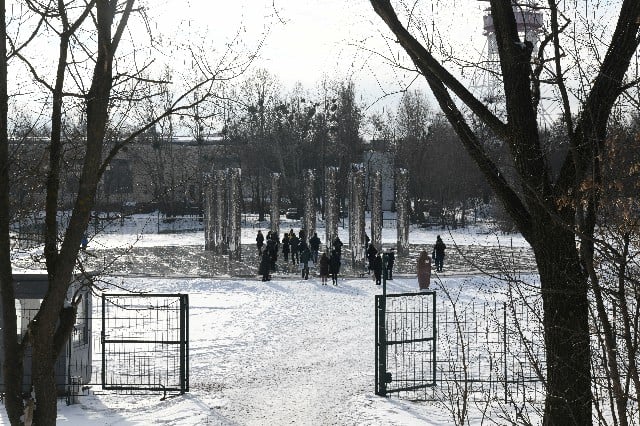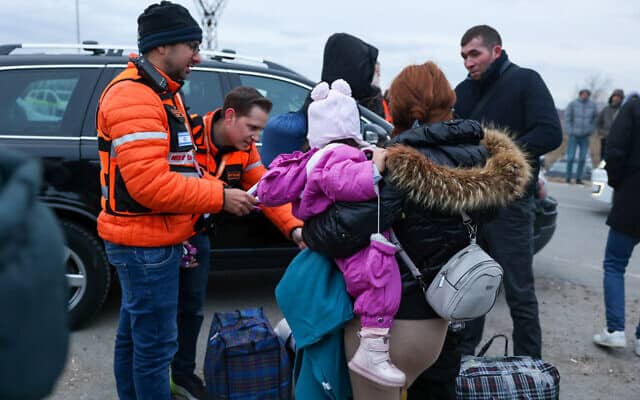Below is a partial list of organizations that have ramped up ongoing efforts in the region or opened emergency mailboxes since the start of the war.
• The Jewish Federations of North America has an emergency mailbox for helping people immigrate to Israel, securing the local Ukrainian community and its institutions and maintaining critical welfare services, among other needs.
•
Tikvah Children’s Home in Odessa has launched an
Emergency Ukraine Relief Campaign as it evacuates over 650 orphans, students, alumni and their families from the war zone into neighboring Moldova.
• The American Jewish Joint Distribution Committee has a longstanding presence in the country, assisting impoverished seniors and supporting a network of Jewish community centers and social service agencies.
• The
Afya Foundation, in conjunction with UJA-Federation of New York, is preparing urgently needed wound care, surgical equipment and biomedical equipment to be shipped to Ukraine.
• The American Jewish Committee’s emergency #StandWithUkraine fund is pledging to direct 100 percent of the funds to those meeting urgent needs in Ukraine, including IsraAID, the rapid response Israeli relief agency, which is assisting refugees of all backgrounds in neighboring Moldova.
• HIAS is working through channels within the US and throughout Europe to support the safe and speedy resettlement of those seeking to leave Ukraine.
• Notes of support and friendship to
HIAS and
Jewish community center staff in Ukraine can be sent to
general inboxes at partner JCCs that are located throughout the Ukraine.
• The Jewish Agency for Israel has opened an emergency hotline to provide Ukrainian Jews with guidance and information regarding the immigration process, as well as general assistance.
• The Chabad-Lubavitch movement has a Ukraine Jewish Relief Fund.
• Masorti Olami has a fund for Ukrainian Relief.
• UJA-Federation of New York has a dedicated mailbox supporting its partners providing humanitarian needs in Ukraine.
• Project Kesher is currently supporting an Emergency Fund for Women in Ukraine.
• Agudath Israel has a Ukraine Emergency Relief fund that has raised $10 million as of March 10.
• United Hatzalah of Israel has sent medical professionals to Ukraine’s borders in Operation Orange Wings. Donations to their fund help deliver medical care to Ukraine.
• JRoots runs heritage trips to Poland to tell the story of the Holocaust. Since Russia’s invasion of Ukraine, it has repurposed to assist Ukrainian refugees into Poland and settle abroad. Contact Ayelet at +972 54-636-6512
• First-responder group IsraAID is on the scene as thousands of Ukrainians seek refuge in Moldova. IsraAID is providing psychological first aid and distributing essential relief supplies. Donations towards emergency support for Ukrainian refugees can be made here.
• Magen David Adom, Israel’s branch of Red Cross International, has established a Russian-language refugee call center. Donations can be made here.
• Hadassah, The Women’s Zionist Organization of America has opened a fund, “Ukraine in Crisis: Save Lives at Risk!” in support of the Hadassah Medical Organization, which is already treating Ukrainian refugees at its centers in Israel.
• The Brussels-based European Jewish Association (EJA), representing hundreds of communities across the continent, has launched a Europe-wide campaign to temporarily provide homes, food and clothing to hundreds of Jewish families whose lives have been torn-apart and up-ended by the conflict in Ukraine. For further information contact: +32 (0)476056450
•
United Jewish Appeal/Keren Hayesod is working together with The Jewish Agency for Israel and the Government of Israel to provide the necessary support to assist Ukrainian Jews hoping to immigrate to Israel during the crisis, as well as supporting Jews hunkered down in Ukraine. It has opened a fund called,
Saving Ukrainian Jews’ lives in the Shadow of War.
• The Orthodox Union has opened a Ukraine Crisis Fund to support individuals and organizations assisting people on the ground in Ukraine.
• World Jewish Relief has been working in Ukraine for the last 30 years, and has helped 13,000 older and more vulnerable Ukrainians within and beyond the Jewish community in the past year alone. Its Ukraine Crisis Appeal is raising funds to support the organization’s 29 partners in Ukraine, along with partners in neighboring Moldova and Poland, which are providing food, cash, medical, material and psychological support to those fleeing or unable to escape the violence.
• The World Union for Progressive Judaism has launched the Ukraine Crisis Fund to support the safety and well-being of the Ukrainian Jewish community.
• Keren Hayesod – United Israel Appeal is working with the Jewish Agency and the Israeli government to expedite immigration to Israel for Ukrainian Jews, as well as assist the Jewish community remaining in Ukraine with essential goods such as food, supplies, security and other necessities.













